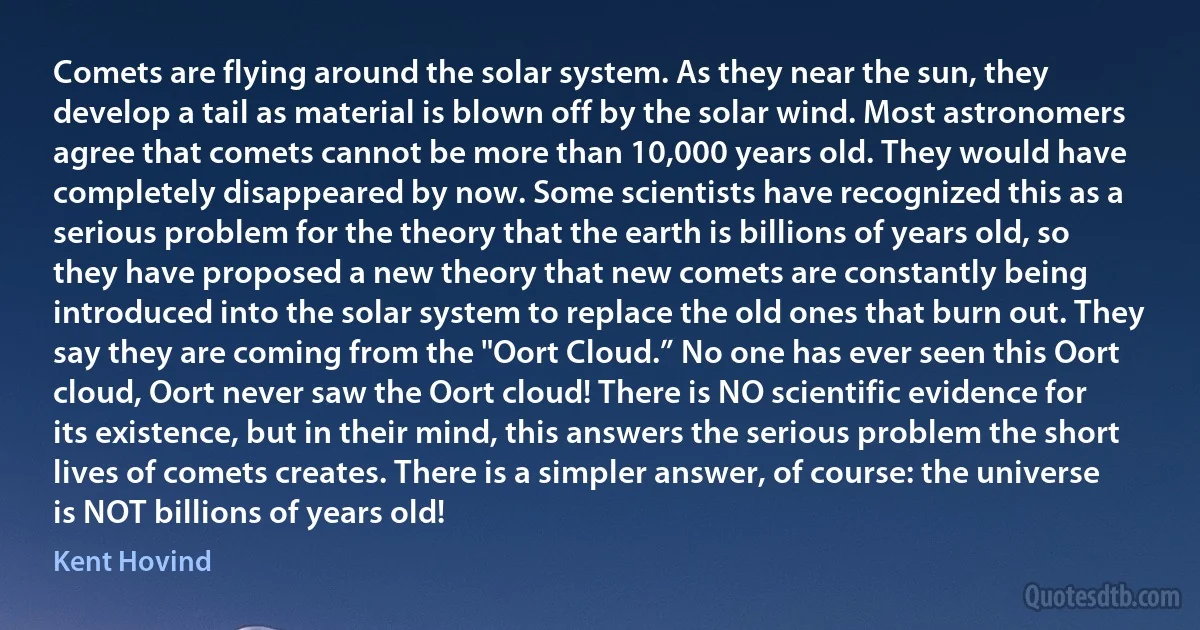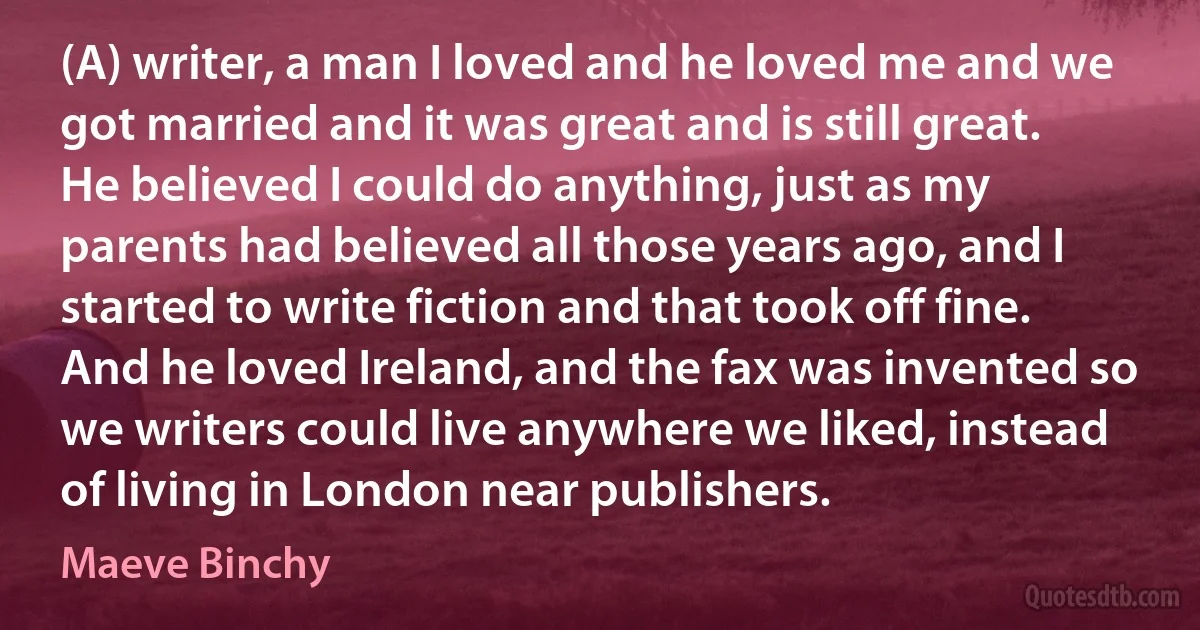Near Quotes - page 13
I'm waiting. ... For something new and strange,
Something I've dreamt about in some deep sleep,
Truer than any waking,
Heard about, long ago, so long ago,
In sunshine and the summer grass of childhood,
When the sky seems so near.
I do not know its shape, its will, its purpose
And yet all day its will has been upon me,
More real than any voice I ever heard,
More real than yours or mine or our dead child's,
More real than all the voices there upstairs,
Brawling above their cups, more real than light.
And there is light in it and fire and peace,
Newness of heart and strangeness like a sword,
And all my body trembles under it,
And yet I do not know.

Stephen Vincent Benét
We heard the shots in the night
But nobody knew next day what the trouble was
And a man must go to his work.
So I didn't see him
For three days, then, and me near out of my mind
And all the patrols on the streets with their dirty guns
And when he came back, he looked drunk, and the blood was on him.

Stephen Vincent Benét
I am making no predictions and the Prime Minister is wise in taking that line, but I am perfectly certain that nothing will enable the German Empire for a generation or two to get anywhere near the same position of dominant force and menace that it was in before the War. I do not say they desire it-I do not believe there is any such desire in Germany at the present moment.

David Lloyd George
They were now as a party engaged in carrying laboriously uphill the last few columns out of the Gladstonian quarry. ... Foremost among the tasks of Liberalism in the near future was the regeneration of rural life and the emancipation of the land of this country from the paralysing grip of an effete and unprofitable system. ... [The reports into rural life] were startling. When they were published they would prove conclusively that there were hundreds of thousands, if not millions, of men, women, and children dependent upon the land in this country and engaged in cultivating it, hardworking men and women, who were living under conditions with regard to wages, to housing, as well as hours of labour-conditions which ought to make this great Empire hang its head in shame that such things could be permitted to happen in any corner of its vast dominions, let alone in this country, the centre and source of all its glory.

David Lloyd George
Equally up to the task was baritone Vytautas Juozapaitis who's tortured characterization of Rigoletto was near flawless, strong and acted with intelligence and emotional depth. Mr. Juozapaitis has a full baritone that displays nice range and clarity, and coupled with the ease with which he commanded the stage, provided just the right measure of appeal that communicated to the audience the conflict and suppressed rage the character, no doubt, felt toward those who used and mocked him. Nicely done!

Vytautas Juozapaitis
It is beyond doubt that the chief motive of Vegetarianism is the humane one. Questions of hygiene and of economy both play their part, and an important part, in a full discussion of food reform; but the feeling which underlies and animates the whole movement is the instinctive horror of butchery, especially the butchery of the more highly organized animals, so human, so near akin to man.

Henry Stephens Salt
But just as the world grew right again,
We heard a wanderer out on the plain
Singing what none of us understood;
Yet we thought that the world grew thrice more sweet
And the meadows were blossoming under his feet.
And we felt a grand and beautiful fear,
For we knew that a marvellous thought drew near;
So we kept the glass for a little while:
And the skies grew deeper and twice as bright,
And the seas grew soft as a flower of light,
And the meadows rippled from stile to stile;
And memories danced in a musical throng
Thro' the blossom that scented the wonderful song.

Alfred Noyes
Did you know that when God made the universe, he didn't lift one finger? He didn't turn one screw or pound one nail. He just spoke and every molecule lined up. That's incredible to think about. When He speaks, the waves lay down; the wind quits blowing. When He speaks, the dead come to life. When He speaks, the universe is created! Everything obeys the voice of God, except us. He's having some trouble out of us right now. But He's going to fix that one of these days when "every knee shall bow and every tongue shall confess that Jesus Christ is Lord to the glory of God the Father," coming to a city near you. But the scoffers are willingly ignorant of how God made the heavens by His Word, and they're ignorant of how the earth was standing out of the water and in the water.

Kent Hovind
Had Kala lived, Tarzan would have sacrificed all else to remain near her, but now that she was dead, and the playful friends of his childhood grown into fierce and surly brutes he felt that he much preferred the peace and solitude of his cabin to the irksome duties of leadership amongst a horde of wild beasts.

Edgar Rice Burroughs
When I was offered the site near the House of Lords... I liked the place so much that I didn't bother to go and see an alternative site in Hyde Park - one lonely sculpture can be lost in a large park. The House of Lords site is quite different. It is next to a path where people walk and it has a few seats where they can sit and contemplate it.

Henry Moore
For ages the army of spirits, once so near, has been receding farther and farther from us, banished by the magic wand of science from hearth and home, from ruined cell and ivied tower, from haunted glade and lonely mere, from the riven murky cloud that belches forth lightning, and from those fairer clouds that pillow the silvery moon or fret with flakes of burning red the golden eve.

James Frazer
It's like this - you are in front of your canvas, you hand holds the paint, ready, raised. The canvas waits, waits, empty and white - but all the time it knows what it wants. So - what does it want, anyway? My hand comes near, my eyes begin to transform the waiting canvas; and when - with my hands holding the paint and my eyes seeing the forms - I touch the canvas, it trembles, it comes to life.

Karel Appel
Among today's Italians, when treading upon Haile Selassie's memory, the sense of guilt and shame is such that they react by seeing only his positive traits: the merits of his past actions. His portrayals always brim with excessive deferance, unwarranted admiration and delusion. They go on and on about his priestly composure, his regal dignity, his great intelligence and his generosity towards former adversaries. They never explain who this sovereign, who we made into a victim, really was. They never dare tell us if he was something more, or less, than a victim. For example, that he was an old man hardened in principles which were centuries out of date; that he was the absolute ruler of a nation which has never heard the words rights and democracy, which lives in a near prehistoric fashion in the suburbs, opressed by hunger, disease, ignorance and the squallor of a feudal regime which even we did not experience during the darkest years of the Medieval period.

Oriana Fallaci



